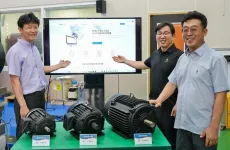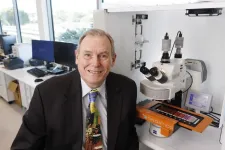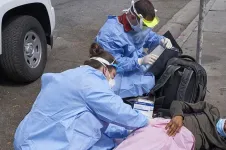(Press-News.org) Tourists acting as citizen scientists have helped a research team detect microplastics on remote Arctic beaches. The global scale of plastic production means that these tiny fragments of plastic are now ubiquitous, and scientists fear that ocean currents will cause plastic to accumulate in the Arctic, damaging ecosystems. But our knowledge of the scale and type of plastic pollution in the Arctic is incomplete. Researchers recruited holidaymakers to carry out sample collection during cruises, hoping to fill in some of the gaps in their knowledge.
“Plastic pollution is now ubiquitous. It is found on land and in soil and most rivers of the world,” said Dr Bruno Walther of the Alfred Wegener Institute, Helmholtz Centre for Polar and Marine Research, author of the study in Frontiers in Environmental Science. “It is even found in the polar oceans and the deepest ocean trenches.”
Plastic gets everywhere
The Svalbard archipelago is Europe’s northernmost landmass – beautiful, remote, and at risk from microplastics transported by ocean currents. Four tourist cruises visiting Svalbard in 2016, 2017, 2021 and 2022 collected sediment samples: all cruises except 2022 also surveyed macroplastic debris (between 2.5 and 10cm in size) for a different study. Initially, single samples were taken from beaches using simple metal tools and sent to the scientists with metadata and photographs to record sampling locations. Later this was expanded to cover whole beaches with sampling grids.
“Citizen science is possible even in remote Arctic beaches,” said Walther. “This helps to cut down on travelling time, CO2 emissions and costs for scientists, and it helps to engage citizens in a global environmental issue.”
These samples were dried out, weighed, and measured. Each sample was filtered to capture particles 1mm or larger in size. This boundary was selected on the basis that larger particles don’t easily become airborne, an assumption that the scientists tested by keeping a bowl of purified water next to their worksurface and filtering it to search for microplastics after their analysis was complete: no microplastics had drifted from the laboratory’s air into the water. To avoid plastic contamination, the scientists ran an air purifier, wore cotton lab coats, avoided synthetic clothing, and covered samples with aluminum lids. Identified plastic particles were examined under a microscope and then analyzed using spectroscopy.
Warning signs
The scientists found that microplastics of the size they were searching for were not widespread but were very concentrated: the estimated overall level of plastic pollution was comparable to areas formerly believed to be much more polluted than Arctic beaches. Two specific sources of plastic pollution were identified in their samples: polypropylene fibers that likely formed part of a fishing net, and polyester-epoxide particles that probably came from a ship’s color coating or equipment.
“Plastic debris from fisheries is the most direct point of entry to the marine realm, and is often particularly important in remote areas,” said author Dr Melanie Bergmann of the Alfred Wegener Institute. “There is an active fishing fleet operating in the waters surrounding Svalbard but also in the North Sea and north Atlantic. Some of the waste that they emit drifts to the beaches of Svalbard.”
The netting appeared to have fragmented very quickly due to the conditions on the beach: repeated freeze cycles, high humidity from fog, and up to 24 hours of sunlight a day in summer. If this rapid fragmentation occurs at other locations, it could introduce tiny, elusive microplastics into the environment very quickly.
“We still need more sampling in the Arctic, in more places and in more regular time intervals to monitor the situation,” said Walther.
“It should be noted that we only analyzed microplastics particles larger than 1mm,” cautioned Bergmann. “This was because of the citizen science approach and to avoid potential airborne contamination by small particles. But our previous studies on Arctic water, ice, and sediment samples have shown that more than 80% of the particles were much smaller. So, we probably would have found more particles, if we had looked for smaller particles, too.”
END
Tourists help scientists reveal microplastic pollution on remote Arctic beaches
Samples collected by tourists on the beaches of Svalbard helped scientists detect microplastic from lost fishing gear
2023-07-21
ELSE PRESS RELEASES FROM THIS DATE:
'Super premium' industrial motor that benefits both business and the environment
2023-07-21
After its successful development of industrial electric motors (three-phase induction motors) with super-premium class efficiency (IE4) for the first time in Korea, the Electric Machine and Drive Research Center of Korea Electrotechnology Research Institute (KERI) has established an "open platform" that enables SMEs to utilize related technologies.
Industrial motors are the machines that consume the most considerable amount of electricity in the world. Industrial motors account for more than 50% of total electricity consumption in Korea. In 2018, KERI published a report1) finding that increasing the efficiency of electric motors ...
Early peanut introduction gaining traction among US parents, but more work needed
2023-07-21
Peanut introduction is not well known among those with less access to health-care information
Having a pediatrician recommend early peanut introduction was best way for parents/caregivers to be informed
Fear of an allergic reaction is the main reason parents decline, but only 1% infants had a reaction, which was mild
CHICAGO --- In 2017, the National Institutes of Health (NIH) announced a dramatic reversal in its approach to peanut-allergy prevention, recommending parents expose their infants as young as four months old to peanuts to prevent peanut allergy.
In the five years since, early introduction ...
Digital pathology set to be a game changer in the medical industry
2023-07-21
Patients will receive faster and more accurate pathology results following a decade-long research project that is set to transform medical diagnosis.
The University of Queensland and Sullivan Nicolaides Pathology (SNP) have automated a microscope scanning and analysis system in Brisbane that has been tested, implemented and accredited ready for rollout around the world.
UQ Professor of AI Brian Lovell said the system significantly improved tests in terms of cost, quality and speed.
“This digital pathology technology processes thousands of tests a day and has been ...
A ‘toolbox of biocatalysts’ improves control over free radicals
2023-07-21
(Santa Barbara, Calif.) — One of the central challenges for synthetic chemists is to impose control over free radicals. Highly reactive molecules with an unpaired electron, free radicals may be familiar to you; these are the type of molecules we take antioxidant supplements for, in an effort to tame oxidative stress.
In the world of synthetic chemistry, however, free radicals hold a lot of promise.
“Free radical chemistry is very useful for the synthesis of both bioactive small molecules and everyday polymers,” said UC Santa Barbara chemistry professor Yang Yang, an author of a paper on the matter that appears in Nature Catalysis. “However, ...
Experts alarmed as free Barbies given to UK primary schools to teach social skills
2023-07-21
Toy company Mattel has been criticised for “stealth marketing” after giving away free Barbie and Ken dolls to schools as part of a programme to teach empathy to children, finds an investigation published by The BMJ today.
Investigative journalist Hristio Boytchev reports that Mattell’s “Barbie School of Friendship” programme, in which free dolls are given for children to carry out role play exercises, has been rolled out to 700 schools across the UK, "with the potential to ...
Impacts of climate change on animals will be “multi-faceted,” study in CABI Reviews reveals
2023-07-21
A new study published in CABI Reviews suggests that the impact of climate change on animals will be “multi-faceted” with “cascading effects” across five welfare domains including nutrition, environment, behaviour, physical and mental health.
The research, highlights how researchers need to carefully consider which domains are immediate and future priority to safeguard the welfare and longevity of animals for food, as domestic pets and those for conservation in nature reserves and zoos.
Animals at risk from the impacts of climate change highlighted ...
Center for Open Science welcomes Yvette Seger to its Board of Directors
2023-07-20
Charlottesville, VA –The Center for Open Science (COS) is delighted to announce the appointment of Yvette Seger, PhD to its Board of Directors. Seger brings impressive experience and strategic leadership across a range of areas that aligns well with COS’s mission, vision, and activities, including policy analysis, advocacy, and implementation.
Seger holds multiple roles as Director of Science Policy, Deputy Director of the Office of Public Affairs, and Director of Strategic Scientific Program ...
Fueled by new chemistry, algorithm mines fungi for useful molecules
2023-07-20
A newly described type of chemistry in fungi is both surprisingly common and likely to involve highly reactive enzymes, two traits that make the genes involved useful signposts pointing to a potential treasure trove of biological compounds with medical and chemical applications.
It was also nearly invisible to scientists until now.
In the last 15 years, the hunt for molecules from living organisms — many with promise as drugs, antimicrobial agents, chemical catalysts and even food additives — has relied on computer algorithms trained to search the DNA of bacteria, ...
Streets recognized by CMS as legitimate locale to deliver health care
2023-07-20
The Centers for Medicare and Medicaid Services (CMS) officially recognized that medical care can be delivered on the street, making it possible for providers like USC’s Street Medicine team to be reimbursed for services provided to people who are currently unhoused.
The decision, which was announced on June 28, 2023, was the result of a multi-year effort on the part of leaders of USC Street Medicine and the Street Medicine Institute to have CMS create a place of service (POS) code for the street. As a result of this designation, street medicine providers nationwide will be able ...
Can prehabilitation improve inflammatory biomarkers in American Indian cancer patients?
2023-07-20
A University of Arizona Cancer Center researcher was awarded a $1.3 million grant from the National Cancer Institute to study the effectiveness of lifestyle interventions in American Indian patients with obesity-related solid tumor cancers who are preparing for surgery.
According to principal investigator Jennifer Erdrich, MD, MPH, there are 13 cancer subtypes linked to obesity that account for 40% of all cancers diagnosed annually in the United States.
American Indian and Alaska Native populations are more than 1.5 times more likely to be obese than the general population and have some of the lowest cancer survival rates in the nation. Many factors ...
LAST 30 PRESS RELEASES:
Novel camel antimicrobial peptides show promise against drug-resistant bacteria
Scientists discover why we know when to stop scratching an itch
A hidden reason inner ear cells die – and what it means for preventing hearing loss
Researchers discover how tuberculosis bacteria use a “stealth” mechanism to evade the immune system
New microscopy technique lets scientists see cells in unprecedented detail and color
Sometimes less is more: Scientists rethink how to pack medicine into tiny delivery capsules
Scientists build low-cost microscope to study living cells in zero gravity
The Biophysical Journal names Denis V. Titov the 2025 Paper of the Year-Early Career Investigator awardee
Scientists show how your body senses cold—and why menthol feels cool
Scientists deliver new molecule for getting DNA into cells
Study reveals insights about brain regions linked to OCD, informing potential treatments
Does ocean saltiness influence El Niño?
2026 Young Investigators: ONR celebrates new talent tackling warfighter challenges
Genetics help explain who gets the ‘telltale tingle’ from music, art and literature
Many Americans misunderstand medical aid in dying laws
Researchers publish landmark infectious disease study in ‘Science’
New NSF award supports innovative role-playing game approach to strengthening research security in academia
Kumar named to ACMA Emerging Leaders Program for 2026
AI language models could transform aquatic environmental risk assessment
New isotope tools reveal hidden pathways reshaping the global nitrogen cycle
Study reveals how antibiotic structure controls removal from water using biochar
Why chronic pain lasts longer in women: Immune cells offer clues
Toxic exposure creates epigenetic disease risk over 20 generations
More time spent on social media linked to steroid use intentions among boys and men
New study suggests a “kick it while it’s down” approach to cancer treatment could improve cure rates
Milken Institute, Ann Theodore Foundation launch new grant to support clinical trial for potential sarcoidosis treatment
New strategies boost effectiveness of CAR-NK therapy against cancer
Study: Adolescent cannabis use linked to doubling risk of psychotic and bipolar disorders
Invisible harms: drug-related deaths spike after hurricanes and tropical storms
Adolescent cannabis use and risk of psychotic, bipolar, depressive, and anxiety disorders
[Press-News.org] Tourists help scientists reveal microplastic pollution on remote Arctic beachesSamples collected by tourists on the beaches of Svalbard helped scientists detect microplastic from lost fishing gear



